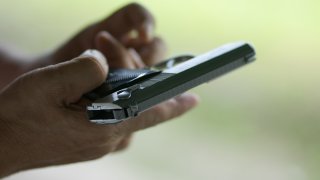
A Delaware proposal to outlaw homemade “ghost guns” that can’t be traced by law enforcement agents because they don’t have serial numbers was advanced by a Democratic-led committee for consideration by the full House.
The committee voted along party lines Tuesday to release the bill after a nearly two-hour public hearing in which the vast majority of commenters spoke against it.
The measure is similar to a bill that failed to get a floor vote last year. It is supported by Democratic Gov. John Carney, who first proposed such a law in 2019.
The bill’s chief sponsor, House Majority Leader Valerie Longhurst, D-Bear, described the bill as a preventative measure.
Get Philly local news, weather forecasts, sports and entertainment stories to your inbox. Sign up for NBC Philadelphia newsletters.
“I think this is just another avenue for illegal guns to be on our streets and be in the hands of the wrong people,” she said, referring to homemade guns.
“I think you’re not seeing a lot of ghost guns now, but they’re starting to become more and more out on the streets,” Longhurst added.
In response to a question from Rep. Tim Dukes, R-Laurel, Longhurst could not say whether anyone in Delaware has been killed with a ghost gun, but that state police have reported confiscating about 60 homemade guns since 2019.
Local
Breaking news and the stories that matter to your neighborhood.
The bill makes it a felony to possess or manufacture an untraceable, undetectable or covert firearm.
An undetectable firearm is defined as one constructed entirely of nonmetal substances, or with major components removed, so it is invisible to walk-through metal detectors. The definition also applies to firearms that include those major components but would not generate an image that accurately depicts the shape of the component.
A covert firearm is defined as one built in a shape that does not resemble a gun.
An untraceable firearm is defined as one for which the sale or distribution chain cannot be traced by law enforcement officials.
The bill also criminalizes the sale, transport or possession of an unfinished firearm frame or receiver with no serial number. The legislation also makes it a crime to manufacture or distribute a firearm made with a 3D printer or to distribute instructions on how to manufacture firearm components with a 3D printer.
Anyone who already possesses an unfinished firearm frame or receiver — a component of a gun that houses the firing mechanism — with no serial number would have 90 days to comply with the law.
The bill is supported by gun control groups including the Delaware Coalition Against Gun Violence and Moms Demand Action, as well as Carney and Democratic Attorney General Kathleen Jennings.
“This bill addresses a growing problem with ghost guns becoming more prevalent in Delaware over the last two years,” said Lauren Vella, policy and legislative director for the Delaware Department of Justice.
Critics argue that the bill will be ignored by criminals, just as they ignore existing gun laws, and will simply criminalize the hobbies and behavior of law-abiding citizens.
They also argue that the bill infringes on the right to own a gun, forces existing owners to surrender their homemade weapons to the government without compensation, and violates the First Amendment by outlawing the distribution of information on how to make your own gun.
“It’s not quite a book burning, but it’s awfully close,” said William McVey, Kent County chair of the Libertarian Party of Delaware
Opponents also question the bill’s exemption for law enforcement officials and members of the military.
“What possible official reason could law enforcement officers or military personnel have for an unserialized weapon?” one commenter asked during Tuesday’s virtual committee meeting, which drew more than 150 attendees.
Mitch Denham, president of a group called Delaware Gun Rights, also noted that the bill’s definition of a firearm receiver, which houses the hammer, bolt, and firing mechanism, does not match the federal definition. Denham suggested the current language could result in felony charges for a person who tries to obtain replacement parts for a store-bought firearm.
“We’re looking into that definition,” Longhurst responded.
Under federal law, only the receiver is considered a firearm. But the law allows individuals to bypass criminal background checks required for firearm purchases by buying unfinished receivers, which do not have serial numbers and can be made fully functional with additional machine or tool work.



